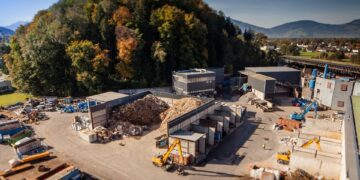Revolutionizing Waste Management: Towards a Greener Future
Waste management has long been a pressing issue for communities around the world. With growing populations and increasing consumption, the amount of waste generated continues to rise, putting a strain on our environment and resources. However, with advancements in technology and a shift towards more sustainable practices, there is hope for a greener future. In this article, we will explore how waste management is being revolutionized and the steps being taken towards a more sustainable and environmentally friendly approach.
The Current State of Waste Management
Currently, waste management practices vary greatly around the world. Some countries have efficient recycling programs and waste-to-energy facilities, while others struggle to properly dispose of their waste, leading to pollution and environmental degradation. Landfills are overflowing, oceans are being polluted with plastics, and greenhouse gas emissions from waste are contributing to climate change.
One of the biggest challenges in waste management is the lack of infrastructure and resources in many parts of the world. Developing countries often lack the necessary facilities and funding to properly manage their waste, leading to open dumping and burning, which can have serious health and environmental consequences.
Advancements in Waste Management Technology
Fortunately, advancements in technology are helping to revolutionize waste management practices. From automated sorting systems to sensor-based waste bins, technology is being used to improve efficiency and reduce the amount of waste that ends up in landfills. Waste-to-energy facilities are also becoming more common, allowing for the conversion of waste into energy through processes such as incineration and anaerobic digestion.
One innovative technology that is gaining popularity is the use of drones for waste management. Drones can be used to survey landfills, monitor illegal dumping, and even collect samples for analysis. This not only helps to improve efficiency and reduce costs, but also allows for better monitoring and enforcement of waste management regulations.
Sustainable Practices in Waste Management
In addition to technological advancements, there is a growing shift towards more sustainable practices in waste management. This includes the promotion of recycling and composting, as well as the reduction of single-use plastics and packaging. Many communities are also implementing zero-waste initiatives, aiming to minimize the amount of waste that is sent to landfills.
One of the key principles of sustainable waste management is the concept of the circular economy. This involves designing products and systems that minimize waste and maximize resource efficiency. By reusing, recycling, and repurposing materials, we can reduce the demand for raw resources and decrease the environmental impact of waste generation.
Challenges and Opportunities in Waste Management
While there are many opportunities for revolutionizing waste management, there are also challenges that need to be overcome. One of the biggest challenges is changing consumer behavior and attitudes towards waste. Education and awareness campaigns are crucial in promoting recycling and reducing waste, but it can be difficult to change ingrained habits and practices.
Another challenge is the lack of coordination and collaboration between stakeholders in the waste management industry. Governments, businesses, and communities need to work together to develop integrated waste management systems that are efficient, cost-effective, and environmentally sustainable. This requires strong leadership and commitment from all parties involved.
The Path Towards a Greener Future
Despite these challenges, there is hope for a greener future in waste management. By embracing technology, promoting sustainable practices, and working together towards common goals, we can revolutionize the way we manage waste and create a more sustainable and environmentally friendly world.
It is important for individuals to take responsibility for their own waste generation and make conscious choices to reduce, reuse, and recycle. By supporting businesses and initiatives that prioritize sustainability and environmental stewardship, we can drive positive change and contribute to a greener future for generations to come.
Conclusion
In conclusion, waste management is a critical issue that requires urgent attention and action. By revolutionizing waste management practices through technology, sustainable practices, and collaboration, we can create a greener future for our planet. It is up to all of us to take responsibility for our waste and work towards a more sustainable and environmentally friendly world.
Together, we can make a difference and ensure a brighter future for generations to come.
Let’s embrace the challenge of revolutionizing waste management and pave the way towards a greener future.











